My Top Five Female Recovery Memoirs
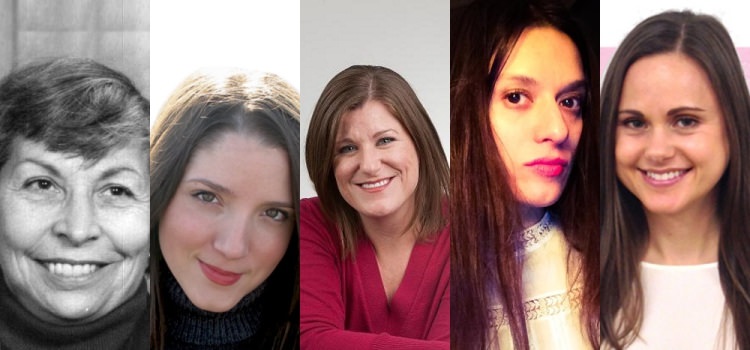
By Regina Walker
Originally published on February 2, 2016 in The Fix
Approximately a year ago, I wrote a piece for The Fix on my Top Four Recovery Memoirs. All four of the books were written by male authors. In the year or so since writing that article, I have read quite a few addiction memoirs by women.
As with the books I shared a year ago, many of these female authors touched me deeply with their honesty and courage. What struck me about these authors was the additional obstacles they faced in sharing their experience with alcohol and substance misuse – the idea that virtuous women aren’t susceptible to addiction. In other words, good girls don’t drink. By opening up about their struggles with substance abuse, they also opened a Pandora’s box of how differently we, as a society, view women who drink.
Statistically, women don’t recover from alcoholism at nearly the rate men do. A study in Germany concluded that alcoholism was twice as fatal for women as for men. The women in the German study with alcohol addiction were five times more likely to die during the 14-year period of the study than women in the general population.
As a culture, we often judge women with addiction issues far more harshly than we do with men. Alcohol advertising often portrays men drinking as a bonding experience, while portraying women who drink as sexual predators or, at the very least, sexually objectified (“if she is going to get drunk, she is asking for it”). Though it’s difficult for anyone with a substance abuse issue to ask for help, it is that much more difficult for a woman, who often bears an additional, gender specific stigma.
Women who have written about their strugglles with substance abuse, therefore, can offer a unique look into the problems women specifically face in finding support. Here’s a list of some of my favorite recovery memoirs by female writers. These women are not just talented writers but essential voices that speak to the unique experiences of the female alcoholic.
I had the opportunity to follow up with all but one of the women on my list and their insights, I believe, are truly enlightening.
* * *
Turnabout: New Help for the Woman Alcoholic
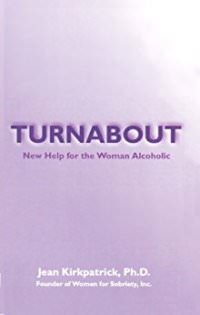 Turnabout, by Jean Kirkpatrick, was published in 1977, but remains as relevant today as when it was published almost 40 years ago. Dr. Kirkpatrick details her life as an active alcoholic, including her stays in psychiatric hospitals and her multiple failed attempts at achieving and sustaining sobriety. Like many female alcoholics, Dr. Kirkpatrick experienced the physical effects of her drinking sooner than men drinkers normally do and was already diagnosed with cirrhosis by the time she achieved sobriety for the final time. Eventually, Dr. Kirkpatrick created her own program of recovery after she felt the program of AA failed her (not that she failed at it) as a woman alcoholic. The book also introduces the reader to the Women For Sobriety Program that Dr. Kirkpatrick founded and which continues on today.
Turnabout, by Jean Kirkpatrick, was published in 1977, but remains as relevant today as when it was published almost 40 years ago. Dr. Kirkpatrick details her life as an active alcoholic, including her stays in psychiatric hospitals and her multiple failed attempts at achieving and sustaining sobriety. Like many female alcoholics, Dr. Kirkpatrick experienced the physical effects of her drinking sooner than men drinkers normally do and was already diagnosed with cirrhosis by the time she achieved sobriety for the final time. Eventually, Dr. Kirkpatrick created her own program of recovery after she felt the program of AA failed her (not that she failed at it) as a woman alcoholic. The book also introduces the reader to the Women For Sobriety Program that Dr. Kirkpatrick founded and which continues on today.
Dr. Kirkpatrick had discussed her experience with Alcoholics Anonymous in a magazine interview in the late ’70s for McCall’s magazine:
The meetings are dominated by men. Women don’t find it comfortable to talk about their drinking histories in front of men.Their [AA] basic concept is “if you keep talking about how terrible things were in your drinking life, you won’t keep drinking.” If women talk about how humiliated they were, they just get stuck. They can’t move forward into recovery. That’s why we put things behind us. We never tell our whole drinking story although we refer to it occasionally.
During her recovery, Dr. Kirkpatrick rediscovered Ralph Waldo Emerson. “I took the book off the shelf and had the most wonderful day of my life. It gave me enthusiasm, hope. It rekindled everything. That day I knew I could make it.” The writings of Emerson and other metaphysical writers spoke to Dr. Kirkpatrick’s need to change her thoughts, thereby changing her behavior. Most important to Dr. Kirkpatrick was the idea that she was powerful and had the ability to take control of her life.
Dr. Kirkpatrick immersed herself in the writings of Emerson and Henry David Thoreau to stabilize her own life in sobriety, as well as creating the Women for Sobriety Program. She completed her long-neglected dissertation once sober, and went on to devote the remainder of her life to championing the needs of alcoholic women. Dr. Kirkpatrick died on June 19, 2000 at the age of 77. She had 26 years of sobriety at the time of her death.
Smashed: Story of a Drunken Girlhood
 Smashed: Story of a Drunken Girlhood by Koren Zailckas, chronicles a 10-year period in Ms. Zailckas’ life (ages 14 to 24) during which alcohol abuse was a common and dangerous occurrence. Written when Ms. Zailckas was a little over a year into sobriety, the book is a stark and frightening account of a young woman’s experience with both the lure and the danger of binge drinking. We follow our narrator as she experiences blackouts, alcohol poisoning, and victimization. Over 10 years have passed since its publication, yet this book remains important and timely. Ms. Zailckas not only shares her own personal journey, but also highlights the increasing, and increasingly dangerous, trend of binge drinking among young women.
Smashed: Story of a Drunken Girlhood by Koren Zailckas, chronicles a 10-year period in Ms. Zailckas’ life (ages 14 to 24) during which alcohol abuse was a common and dangerous occurrence. Written when Ms. Zailckas was a little over a year into sobriety, the book is a stark and frightening account of a young woman’s experience with both the lure and the danger of binge drinking. We follow our narrator as she experiences blackouts, alcohol poisoning, and victimization. Over 10 years have passed since its publication, yet this book remains important and timely. Ms. Zailckas not only shares her own personal journey, but also highlights the increasing, and increasingly dangerous, trend of binge drinking among young women.
I emailed Ms. Zailckas recently to follow up on her thoughts about her book, its impact and her thoughts about addiction. At the time of its publication, Ms. Zailckas did not identify herself as an alcoholic. I asked her about this and she reflected on her personal experience of her use of alcohol at that time:
Well, I identify as someone who’s lived for a long time with dissociation and complex PTSD (post-traumatic stress disorder). I wrote Smashed just over a year into sobriety, and at the time, I didn’t really have the information, support or self-reflection I needed to put that into words. What came out instead was all twenty-something bravado: “I’m not an alcoholic.”
But when I look back now, I see the clue right there in the title: Smashed. It’s the story of someone who drinks in order to split herself off from her traumatic history—someone who needs the chaotic distraction of hangovers and nights out to prevent her from piecing together frightening childhood events and giving them meaning. Ironically, abusing alcohol just led to encore performances of the same traumas I was drinking to escape, specifically sexual assault.
My earliest life lessons were taught to me by people with addictions and personality disorders. So even though I identify as a trauma survivor, I also struggle with a lot of codependent behaviors that I learned from alcoholics. I struggle with boundaries. For a long time, it was first-nature to keep secrets or run away from problems.
I asked Ms. Zailckas if she believed addiction was a disease. “Yes,” she responded, “I believe addiction is a disease – a chemical reaction in the body that changes the brain. But I also think it’s a kind of dirty, depraved gift – a mark of distinction like Harry Potter’s scar or Frodo’s incorruptible heart – because recovering alcoholics are some of the wisest and most loving people I know.”
Finally, I asked Ms. Zailckas how she maintains her sobriety.
I’m a one-on-one talk therapy kind of girl. Between therapy, the writing process, right speech and mindful breath, I have most of the coping skills I need. My biggest challenge is the eternal struggle to stay emotionally present, without being overwhelmed by traumatic memories and emotional triggers.
Instead of turning to substances, I’ve learned to put it all in a box. Literally – I went out and bought myself an index-card file. Anytime a memory pops up – a song my mother used to sing, the pattern of the wallpaper in my parents’ bedroom, anything – I write it down on an index card, secure in the knowledge that I can return to it later, either adding more or using it to inform a piece of fiction I’m writing. That way, I’m not repressing the past, but I’m not consumed by it either. The box makes this really satisfying click when I shut it. The sound provides a funny kind of agency. I hear it and feel like I’m in control. The past is in its rightful place. All’s well. I’m safe.
Blackout Girl: Growing Up and Drying Out in America
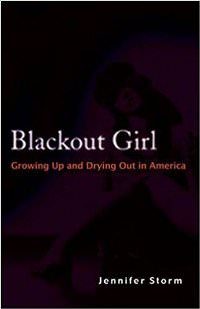 Blackout Girl: Growing Up and Drying Out in America by Jennifer Storm, follows a teenaged and young adult Ms. Storm as she utilizes alcohol and drugs to anesthetize herself against numerous personal traumas. As her drinking and drug use escalated, so did the ugly consequences, until she became suicidal. Ms. Storm was able to resolve the issues she was drinking to escape – including being raped, as well as her own confusion over her sexual orientation – and free herself from the further victimization of addiction.
Blackout Girl: Growing Up and Drying Out in America by Jennifer Storm, follows a teenaged and young adult Ms. Storm as she utilizes alcohol and drugs to anesthetize herself against numerous personal traumas. As her drinking and drug use escalated, so did the ugly consequences, until she became suicidal. Ms. Storm was able to resolve the issues she was drinking to escape – including being raped, as well as her own confusion over her sexual orientation – and free herself from the further victimization of addiction.
I followed up with Ms. Storm and asked her on the worst day of her addiction, how did she think it would all end?
“My worst day was November 9, 1997,” she said, “When I very intentionally and violently attempted to take my own life. It is truly the grace of a higher power that saved me. I never saw any other way out, I thought I would die in my addiction. Thankfully, my story continues.”
She also remarked, “I never felt any difference directly (being a woman with an alcohol problem) but I do believe societally we have different expectations and standards for women. Society tends to go lighter on men who drink heavily and they aren’t scrutinized as closely.”
Ms. Storm describes her life now as
amazing and beyond my wildest expectations. I know today that I can be and do anything I set out to do, as long as I wake up each day and choose not to use, I am free. I have had many failures in sobriety but I love them all for they have taught me valuable lessons, chief among them that the only failure is in a lack of trying. I love to try new things, venture down new paths and expand my education and horizon. Each day is truly a new beginning and I am just so grateful to know that I have choices today. My addiction no longer encapsulates me and that provides a freedom unlike anything else.
Drunk Mom
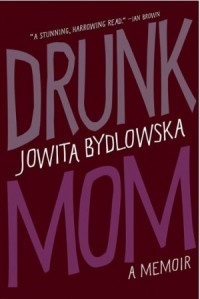 Drunk Mom by Jowita Bydlowska is a brutal but honest read. Ms. Bydlowska opens the door to one of the more taboo type of problem drinkers – moms. Shame, guilt and remorse plague many individuals with active addictions but there is a special kind of shame felt by the alcoholic mom, and a particular disdain felt by others for a “drunk mom.” Ms. Bydlowska allows the reader entrance into that dark place and the experience is, at times, hard to endure.
Drunk Mom by Jowita Bydlowska is a brutal but honest read. Ms. Bydlowska opens the door to one of the more taboo type of problem drinkers – moms. Shame, guilt and remorse plague many individuals with active addictions but there is a special kind of shame felt by the alcoholic mom, and a particular disdain felt by others for a “drunk mom.” Ms. Bydlowska allows the reader entrance into that dark place and the experience is, at times, hard to endure.
I asked Ms. Bydlowska what kind of feedback she received after her book was published. “There was a lot of positive feedback but there were also lots of negative responses. A few years before my book came out, a male author published a book about being a father addicted to crack cocaine (in the first scene he scores drugs next to the hospital where his wife is in labor with their first child). There was tiny buzz about the book and he was mostly sympathized with and ended up getting a parenting column, eventually. When my book came out, there was a lot of pearl-clutching by some of the media.”
Ms. Bydlowska continued,
I think there’s more shame for women to admit they have an alcohol problem because it’s not very “lady-like.” We’re supposed to be more composed, socialized, and so on. This is the reason why a lot of women drink secretly, after everyone goes to bed, the same way I used to. A man who is drunk is often perceived as funny, social – he drinks in pubs with buddies and he pukes in alleys and laughs about it the next day.
Finally, Ms. Bydlowska shared, “In order to maintain my sobriety, I see my therapist once a week. She’s very helpful and perceptive. First therapist I’ve ever had who calls me on my bullshit, which makes me angry but which I need. I occasionally attend the agnostic meetings of AA.”
Yellow Tale
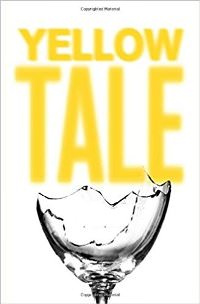 Tiffany Goik is the author of Yellow Tale. In her debut book, Ms. Goik initially presents the dubious image of the “functional alcoholic.” On the surface she has a job, friends, and a privileged background. Yet as her story progresses, we see her unravel into a round-the-clock drinker who ends up broke, homeless and hospitalized for an alcohol-induced coma. (At the time of her hospitalization, Ms. Goik’s blood alcohol content was higher than Amy Winehouse’s at the time of her death.) Ms. Goik further illustrates the growing trend of young women who develop serious alcohol problems before they are legally allowed to drink. Ms. Goik “sobered up” at 28, yet her story continues.
Tiffany Goik is the author of Yellow Tale. In her debut book, Ms. Goik initially presents the dubious image of the “functional alcoholic.” On the surface she has a job, friends, and a privileged background. Yet as her story progresses, we see her unravel into a round-the-clock drinker who ends up broke, homeless and hospitalized for an alcohol-induced coma. (At the time of her hospitalization, Ms. Goik’s blood alcohol content was higher than Amy Winehouse’s at the time of her death.) Ms. Goik further illustrates the growing trend of young women who develop serious alcohol problems before they are legally allowed to drink. Ms. Goik “sobered up” at 28, yet her story continues.
I asked Ms. Goik if she felt she was perceived differently as a woman with an alcohol problem.
I do in the sense that it’s less expected for a woman to have a problem with alcohol than a man. I think they have a hard time believing it, or wrapping their head around it, which goes back to the expectations or preconceived ideas of what an alcoholic is supposed to look like. It’s becoming less so, but there is still this image in many people’s heads of what an alcoholic is and is not. For me, most folks thought I maybe drank one too many cosmopolitans at a sorority party at first. Until they heard my story, of course. I’d hear things like “but you look so normal!” And I’d think to myself, “I may look normal, but I’ve never felt normal a day of my life.”
I also asked Ms. Goik when she was at her perceived “bottom” – the worst day of her addiction – how did she think it would all end?
To be totally honest, I wasn’t sure. It was almost like I had lost the ability to think past the present moment, which is ironically something we strive for in recovery. I guess in the back of my mind I thought Prince Charming would come and save the day. And then other times I thought I would magically wake up one day and get my life together. Which is sort of what happened in some respect, but not in the way I expected. I just remember these moments I’d stop and allow myself to actually think about how bad things were, and only being able to sit with that feeling for a few seconds before I reached for the bottle. It was awful, and something that keeps me sober today.
* * *
Alcohol abuse, particularly binge drinking, has increased significantly in women in recent years. Women who misuse alcohol are at a greater risk than men for intimate violence including sexual and physical assault. Due to physiological differences, medical complications of alcohol abuse are seen far earlier and with less alcohol consumption in women than men.
Much confusion and differing opinions continue to exist regarding addiction in general. Some like to identify addiction as a “disease” but how many diseases are illegal? And the female alcoholic continues to be viewed as somehow weaker and lacking in morality than her drinking male counterpart. Alcohol-related deaths account for 3.8% of all deaths worldwide. Women are accounting for a growing number of these deaths and are seen, in some studies, as surpassing men in increases in binge drinking. To some, this would be considered an epidemic worthy of great attention and action. But that attention has not been forthcoming…
“ … there are many who want it but for whom the train of compulsion doesn’t seem to stop. They never get that moment, that pause that will be long enough for them to get off. Because that’s all it is—for some the train is too fast, some sleep through the stops, some jump off and jump right back on because they forget immediately that this is the death train. Me? I slept, went too fast, forgot… but then finally, stopped, limping on my broken toe, the lies falling off me, making me light, making me vulnerable. Making me strong. So strong that for one moment I could halt the whole fucking train.”
Jowita Bydlowska, Drunk Mom
If you click on any of the above images of the book covers, that will take you to Amazon and there (“Customers who bought this item also bought”) you will find another dozen or so books written by women in recovery. Of course none of these are “conference-approved”. God forbid: the books are by and large not dogmatic nor focused on the 12 Step program and its Higher Power (whom many choose to call “God”). But they are indeed very well told stories about the successful recovery of women from alcoholism and addiction.

























Great read Roger – thanks for this!
Conference-approved literature is merely the tip of the iceberg of recovery books available. The ease of modern self-publishing insures that the flood of choices will continue.
The great shame of the “conference-approved” fixation of typical AA members and AA groups is that books like these don’t even enter the awareness of attendees of meetings. Literature tables are very limited. The “one book and one book only” crowd doesn’t help.
“Not-God,” the brilliant history of AA, by the late Ernie Kurtz sold only 65,000 copies its first 35 years in print. That’s an embarrassment to Alcoholics Anonymous, and a victory for the anti-intellectual base. Dog bless you Amazon.com.
Party Girl by Anna David is also good.
Thanks for taking the time to write such a thorough review of recovery memoirs by women. I’ve tried to quit myself three times now (I’m on day five of the third try, so wish me luck), and I LOVE to read. These books give me hope and inspiration (and sadness and tears, of course). Drinking: A Love Story by Caroline Knapp was my first favorite.
Turnabout just came in the mail today and I cannot put it down. Thank you again!